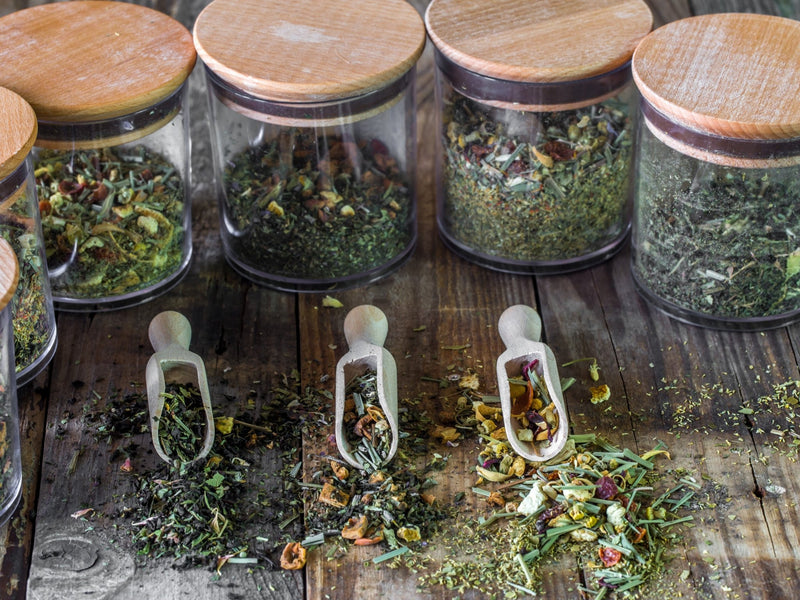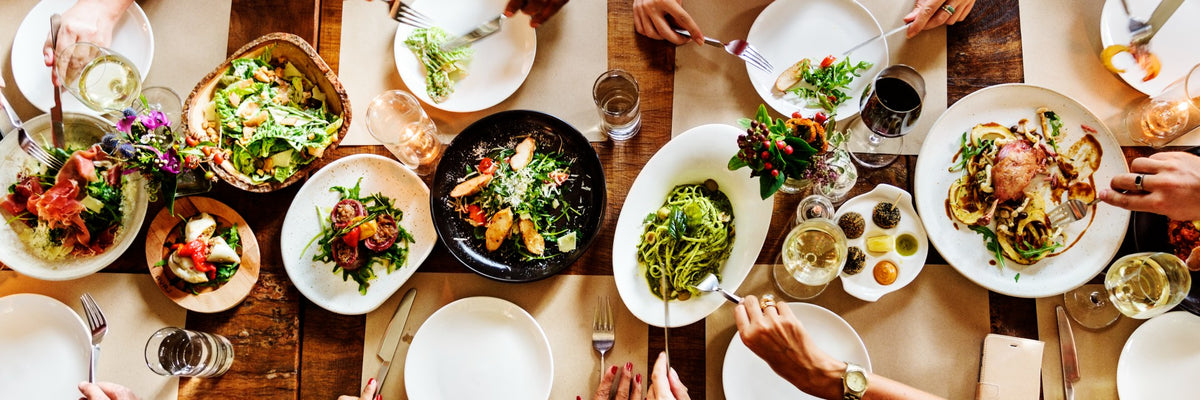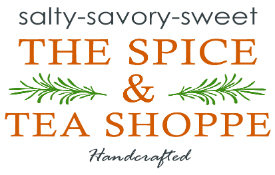
Loose Leaf Tea: The Eco-Friendly and Healthy Choice
Are Tea Bags Harmful? The Surprising Environmental and Health Concerns.
When you reach for loose leaf tea over tea bags not only do you elevate your taste experience, but you are helping reduce your environmental impact and making a healthier choice. You may ask how choosing loose leaf tea reduces environmental impact over tea bags, and here are several ways in which you are helping and might not even be aware.
Packaging: Tea bags often come in individual packets, which creates more packaging waste. By selling our loose-leaf tea in larger quantities this reduces the amount of packaging required and loose tea can be stored in reusable containers that you already own.
Material:
Most tea bags are made from a blend of paper and plastic fibers, which makes them difficult to recycle. Some tea companies have started producing biodegradable tea bags made with plant-based materials, but these are still a very small portion of the market and many still contain harmful chemicals which are used to seal the bags.
Quality:
Loose leaf tea is generally to be of a higher quality than tea bags, because the tea leaves have more room to expand and infuse in hot water. This means that you can use less tea per cup and still get a flavorful brew. Additionally, loose leaf tea can often be steeped multiple times, which further reduces the amount of tea required overall.
Transport:
Loose leaf tea takes up less space and is lighter than tea bags, which means that it requires less fuel to transport. This can result in lower carbon emissions and a smaller environmental footprint.
Economic Benefits:
One of the economic benefits of serving loose tea is the cost savings. Quality goes up while the cost per serving goes down. By purchasing loose leaf tea in larger quantities, you can save money. Additionally, the improved quality of our loose-leaf teas lets you fully appreciate the flavors and aromas of tea even more, which is a worthwhile investment in your tea-drinking experience. Overall, choosing loose leaf tea can be a more sustainable choice for those concerned about environmental impact.
Consider the numbers:
Tea Bags
1 lb. of typical mass market tea can easily produce 350 tea bags per lb. Made up of very fine small bits of broken tea, also known as tea dust or fanning's, approximately 1.5 grams of dust is put in each tea bag. These smaller, lower-quality particles have a greater surface area to volume ratio compared to whole tea leaves, which results in a stronger brew producing an often bitter, strong cup. Additionally, these types of tea are harvested with heavy equipment requiring fossil fuels in harvesting, impacting the tea quality and the environment.
To make 350 teabags requires:
- 350 staples
- 350 lengths of string
- 350 pieces of paper
- 350 nylon or other synthetic sheets (more on that below)
- 350 foil or paper over-wrap sheets
- Outer packaging - most tea bags come in boxes of 20 requiring at least 17.5 cartons (per 350)
- Most case packs carry 12 so you will need at least 2 large cardboard shipping boxes per lb.
The result?
- Increased shipping weight
- Increased fuel consumption
- Increased resource consumption
- Increased non-reusable waste
Are Tea Bags Harmful?The Surprising Truth Beyond Environmental Concerns:

Many of us enjoy a good cup of tea to start the day or unwind in the evening, but could tea bags be doing more harm than good? Recent studies have shown that a typical grocery store shelf with individually packaged boxes of teas can be harmful to our health. These tea bags can release billions of micro and nano plastics into our hot water, and some tea bag materials are worse than others.
One of the main culprits is nylon tea bags, which contain polypropylene that can break down into micro and nano plastics. These tiny particles can be harmful to both the environment and our health, as they can enter our bodies and accumulate over time. In fact, researchers at McGill University tested four popular tea brands and found that a single plastic tea bag can release 11.6 billion microplastic and 3.1 billion nano plastic particles into hot water.
Paper tea bags are not much better, as they often contain a chemical called epichlorohydrin that is used to seal the bag and prevent it from breaking. This chemical can leach into hot water and has been found to be a potential carcinogen and reproductive toxin. While the levels of epichlorohydrin released by tea bags are not yet fully understood, studies have shown that they can be thousands of times higher than those found in other products such as water bottles.
So, what can we do to avoid these harmful effects on the environment and our bodies?
Loose Tea
- 1 lb. produces approximately 300 cups of tea with no added environmental cost and superior flavor.
- Certain loose-leaf teas, if steeped in water between 180°F - 190°F can offer multiple infusions such as greens and oolongs which produce excellent cups in this manner and can steep up to 500 cups or more.
- Significant reduction in packaging and transportation
- By using a reusable tea infuser made from stainless steel or silicone, which can be filled with loose tea and reused thousands of times over decades, you can eliminate the potential health risks while also being environmentally conscious.
- Added bonus - composting!
Did you know loose tea leaves can be used as compost?
Tea leaves are a great source of nitrogen, which is an essential nutrient for plant growth. When added to a compost pile, tea leaves can help to increase the nitrogen content of the compost, which can promote healthy plant growth when the compost is added to soil. When adding tea leaves to a compost pile, it's also a good idea to mix them with other organic materials such as vegetable scraps, grass clippings, and dried leaves to create a balanced mix of nitrogen and carbon. This will help to ensure that the compost breaks down properly and does not become too wet or too dry.
Can used tea bags be added to composting?
It's important to note that most tea bags cannot be composted and worse most tea bags may contain synthetic materials such as nylon or polypropylene, which are not biodegradable and can release harmful chemicals into the soil.
In summary, choosing loose leaf tea over tea bags can be a simple yet effective way to reduce your environmental impact and help us make healthier choices. By minimizing packaging waste, using reusable steeping equipment, and maximizing the quality and efficiency of your tea consumption, you can enjoy a delicious cup of tea while also supporting a more sustainable lifestyle helping you feel good inside and out.
By making informed choices about the products we use, we can protect both ourselves and the environment and that's what we call a win-win!
Let's Get Cooking
For more culinary inspiration, be sure to visit our recipe page. Here, you'll find a diverse collection of delicious recipes for every taste, season and occasion.

